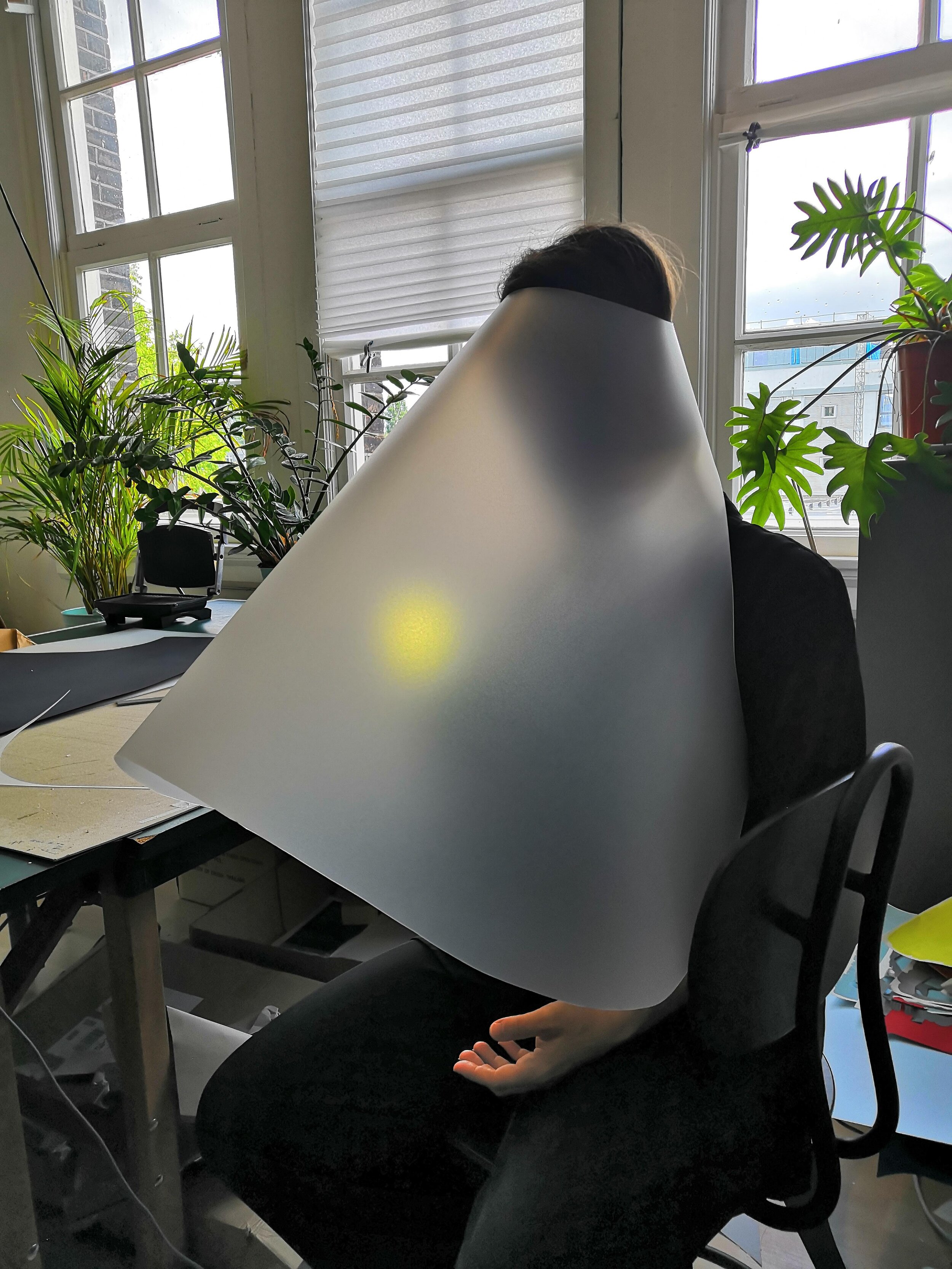WINWIN a consensus algorithm
a project by Nienke Huitenga
& James Bryan Graves
in collaboration with Sandberg@Mediapark Masterclass 2019, Other Futures Festival 2020, Autres Directions and Creative Industries Fund NL
development stage: early proof of concept

WINWIN is a performative experience for a small group of people guided by an algorithm: they debate a societal issue, dressed in playful statements, to discover common ground within the group.
WIN WIN is an early prototype of a discussion and participatory performance, based on consensus and inspired simultaneously by digital algorithms like paxos, flat hierarchical social organizational structures like occupy, holacracy and sociocracy, anarchist philosophy, the squatting movement and the Dutch polder model. The participant is installed temporarily into a 'consensus-zone-data center' where 'immersive' fashion and sound also preserve the attention and anonymity of a person-node. The performance is designed to create a pleasant ambiance for anonymity, and at the same time make the 'person-node' a radically equal player in a group. WINWIN is based on algorithmic themes such as: a person-node always works and knows the state of the system without knowing how many other person-nodes are also participating in the system.
Welcome!
Step into the consensus-zone-data center.
Sit down comfortably. Get out your smartphone. Immerse yourself.
You are now a person-node 🖤
Together with the other nodes you are part of an algorithmic movement.
You are here to engage with the polarizing dilemma’s of society.
Some easy, some more challenging.
It is up to you and your fellow nodes to re-establish harmony.

TESTERS WANTED
We are looking for opportunities and places to test our offline and online version of WINWIN
Our world increasingly moves at different speeds.
Our current technological and financial landscape of modern states are in friction with the communication and organisational structures of our representational democracy. It is known that democracy in general adapts slower than technology. That slowness protects us, makes our society stand firm in a changing world. However it also harms us in times where technology has a firmer grip on the ways we think and make decisions.
We’re fascinated by disruptive governments and movements like the occupy movement. Fueled by idealism, the group gets stuck at passionately proclaiming the things they want to stop, however never internally coming to an agreement of how things should be different.
They often collapse just before the deciding breakthrough.
Nowadays the process of democratic thinking has been sculpted into new routines by technology, into a rhythm dictated by an infosphere that we are feeding every day on news platforms and apps, on Twitter, Reddit, Instagram, Facebook and Whatsapp groups. And, debating online is not always a pleasant experience if you look at very recent history. The rise of the Yellow Vests, climate deniers and COVID pandemic protesters show how citizens are confronted with extremes: long term goals and expectations set off against instant gratification. The impatience combined with the grandeur of narratives show in these online space.
The ever expanding mass of information will give anyone the possibility to find ‘proof’ for their own ‘reality narrative’. We, as creators of WINWIN, have titled this the infinite narrative dilemma. ‘Extreme alternative views’ will only increase at the pace of the growth of this phenomenon. Think about the 5G conspiracy theorists, the anti-vaxxers, fake news outrcriers and even the flat earthers . WINWIN came to be when creators Nienke and James had a conversation about ‘how could you both live in that same reality and figure out ways to move forward to the future?’ It is likely you will never agree with a flat earther on the fact the earth is flat, but rather might find the actual issue lies with how scientific information is shared or revealed to the public. On that point you can act together and have a new conversation.
Haven’t we all had this experience when talking about for example the climate crisis, the discussion will be at some point no longer about the topic? You end up debating for the debate (to win or proof a point). Discussion is by nature dialectical, using rhetoric to create contrasts, juxtaposition and enlarge our differences. As a result, with modern day online ‘upvoting’ and facebook threading-like ‘talking’ etiquettes, admitting common ground or celebrating new found commonality from discussing differences on a point is not a ‘winning’ move in a debate anymore, so it seems.
A new ritual for democracy. We feel strongly that WIN WIN can help uncover underlying statements, ideas, perspectives in a debate that will make the common ground just as visible as the contrasting opinions. Therefore our consensus algorithm can be an interesting alternative to the polarizing and divisive nature of traditional debate.
Technology did not eliminate our gut feeling, or our subjective projections on reality. Nienke has seen through the transmedia strategies she designed for Human Bird-wings, The Modular Body that the strength of a speculative futuristic narrative in an online/digital space usually comes down to the conversation people will have around the story. If the narrative is open enough to join and allows for critical thinking, people feel invited to reflect and assess together what they are seeing. They start to ask critical questions, answer each other’s doubts, comments and judgy snarks. In her experience as a transmedia strategist well told stories can create the right arena to find a common ground where people are willing to determine a common starting point. WIN WIN should be a bridging tool in as such where technology helps us dive deeper into our thinking, while crafting the best possible conversation you could have our a topic with a strong conversation potential.
new routines for democracy
WINWIN matches the empathic nature of humans and the harmonizing potential of technology. We aim to redesign the online debate routines of a democratic society.





